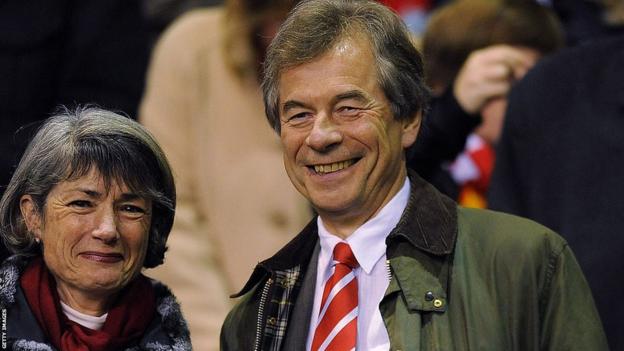[ad_1]

Nation state funding of football clubs is “philosophically” a better fit than private equity funds, says ex-Liverpool chairman Sir Martin Broughton.
Billionaire Sir Jim Ratcliffe and a Qatari consortium have made offers, while involvement from private equity funds has also been suggested.
Broughton said: “Private equity is an unsuitable owner of sports’ teams.”
“The US doesn’t let them buy any sports franchise,” added British businessman Broughton, who was chairman at Liverpool in 2010 and also part of a consortium that tried to buy Chelsea last year.
“The standard operating procedure is buy with as little equity and as much leverage as possible, get your equity back as quickly as possible through dividends, then flip it as soon as there is a good profit.
“Nothing wrong with that process in other industries, but it is so far from what the fan wants.
“Football clubs are community entities. They are emotional assets. The fans want equity and no debt.
“Nation states are more appropriate. They take a longer-term view, tend to invest on higher equity, lower debt basis and don’t have a need-to-sell time frame.
“People might not like the particular nation state, but philosophically, I have less concern with a nation state owning something than private equity.”
United have received offers for 100% of the club from Ratcliffe’s Ineos group and Qatari Sheikh Jassim bin Hamad Al Thani through his foundation.
Amid suggestions of a difference of opinion between the Glazer family’s six United directors over how to proceed, sources have told BBC Sport no clarity has been given over the likely direction of the ownership or the speed any deal could be activated.
It has been suggested it would take a bid in the region of £6bn for the Glazers to sell United.
But up to £2bn may need to be added to that fee should current analysis over stadium development conclude the better option would be a completely new ground.
United’s current debt, which was £514.9m up to June 2022, may also need to be factored in.
Mike Forde, executive chairman at the Sportsology Group, which says it helps teams to solve ‘strategic and organisational questions’, told the FT Business of Football Summit that the purchase price might only be the start.
“What is the real cost of acquisition?” he said. “What is the true cost of being competitive?
“If you don’t win games there is pressure on the owner. There is a big difference between the valuation of a team with an average age of 23, with players on long contracts, to one where the average age is 31 and they are not.
“There are instances where the owner says, ‘you said it was going to be this and it is four times that’.”
By Simon Stone
Source link




